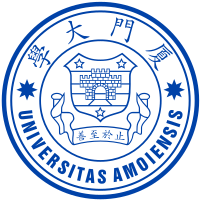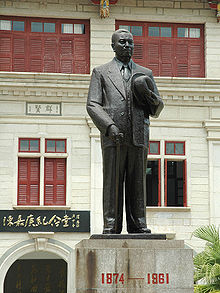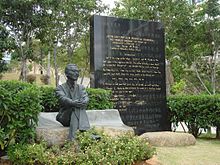Xiamen University
 | |
| Latin: Universitas Amoiensis | |
Former name | Amoy University |
|---|---|
| Motto | 自强不息,止于至善[1] |
Motto in English | Pursue Excellence, Strive for Perfection[1] |
| Type | Public university |
| Established | 1921 |
| President | Zhang Rong |
Academic staff | 4,600+ |
| Students | 28,133 |
| Undergraduates | 20,277 |
| Postgraduates | 16,562 |
Doctoral students | 4,297 |
| Location | Xiamen , Fujian , China |
| Campus | urban, 524.3 ha |
| Nickname | Xia Da, Ha Tai |
| Affiliations | Global U8 (GU8) |
| Website | www.xmu.edu.cn |
 | |
| Xiamen University | |||
|---|---|---|---|
| Simplified Chinese | 厦门大学 | ||
| Traditional Chinese | 廈門大學 | ||
| |||
Xiamen University (Chinese: 厦门大学; pinyin: Xiàmén Dàxué), colloquially known as Xia Da (Chinese: 厦大) in Mandarin Chinese or Ha Tai (Chinese: 厦大; Pe̍h-ōe-jī: Hā Tāi) in Xiamen dialect, is a public research university in Xiamen, Fujian, China. Established in 1921 by Tan Kah Kee, a member of the overseas Chinese diaspora, the university is perennially ranked as one of the top academic institutions in Southern China, with strengths in economics and management, fine arts, law, chemistry, journalism, communication, and mathematics.
Today, Xiamen University hosts over 40,000 students on its four campuses.[2] It is a Class A institution under the national Double First Class University Plan.
Ranking reputation[]
In 2021 QS World University Rankings, Xiamen University ranked 432nd in the world.
The QS Asian University Rankings 2021 ranks Xiamen University 68th in Asia.
The Times Higher Education World University Rankings 2021 placed Xiamen University between 501-600 in the world.
History[]
This section needs additional citations for verification. (June 2021) |
Private period[]

In 1919, Tan Kah Kee, an overseas Chinese businessman, donated millions of dollars to endow Amoy University in the city of Amoy (Xiamen). The university was founded in 1921.
Start-up, the school with normal, business two, a penny under the normal department, management of two, preparatory two years, undergraduate four years. When Xiamen University was founded, there were no more than 20 faculty members and only 98 students.
Change to national university[]
At the 1926 Sesquicentennial International Exposition in Philadelphia, United States, Amoy University was one of five institutions selected to participate in an exhibit on education in China, representing the country's higher education system.[3]
Tan transferred administration of Amoy University to the Nationalist government in 1937, and the institution became a national university.




In 1938, at the outbreak of the Second Sino-Japanese War, the university temporarily relocated to Changting in western Fujian to escape Japanese invasion of Chinese coastal regions.
At the end of World War II in 1946, Amoy University moved back to Xiamen and resumed normal operations. In 1952 it became a comprehensive university embracing both arts and science. In 1963, it was designated as a state key university.
In the 1970s, the institution's English name was changed to Xiamen University[4] referring to Xiamen, the new English name for Amoy.
In 1995, Xiamen University was selected to participate in the 211 Project, a national government initiative to provide increased financial resources for China's most promising universities.[5] In 2000, the university was selected for the 985 Project, a national and local government initiative to provide funding for facilities construction and faculty hiring to bolster China's top universities.[5]
On January 25, 2013, the Ministry of Higher Education of Malaysia submitted an invitation letter to Xiamen University of China to open a branch campus in Malaysia.
On July 3, 2014, the foundation of Xiamen University Malaysia Campus was laid in Kuala Lumpur.On February 22, 2016, Malaysia Campus officially opened.
In September 2017, Xiamen was recognized as a Class A institution in the Double First Class University Plan, a national government initiative to cultivate a group of elite Chinese universities into "world-class" institutions by 2050.[6]
International cooperation[]
Xiamen University has maintained a global presence since its creation in 1921, attracting students from overseas Chinese communities in Southeast Asia, particularly Malaysia. The institution established an "Overseas Correspondence Courses" program in 1956 and accepted its first foreign students in 1981.[7] Xiamen University now has an extensive portfolio of international collaborations, including an International Cooperative Program for Innovative Talents funded by the China Scholarship Council, [8] and global exchange and cooperation relationships with over 300 universities.[9] It has established 16 Confucius Institutes with partner institutions in 13 countries.[9]
In 2011, Chinese Premier Wen Jiabao and Malaysian Prime Minister Najib Razak began high-level discussions about creating a Malaysian branch of Xiamen University.[10] Subsequently, in 2015 the Xiamen University Malaysia Campus was established. Known as "XMU Malaysia", the institution has been described as "historic" and is notable as the "first ever large-scale international branch" of a Chinese university.[11] Professor Wang Ruifang was named the first chancellor of XMU Malaysia.[10]
On 23 May 2016, Xiamen University sent a delegation to the Tokyo Institute of Technology in Tokyo, Japan to meet with leadership and professors. The delegation's objective was to discuss the institutions' strategies for commercializing research findings, fostering university-industry collaboration, and encouraging international students to learn about local language and culture.[12]
On 18 November 2016, Xiamen University and Cardiff University in Wales, United Kingdom initiated a "strategic partnership" including a program for co-supervision of doctoral students, and £1.2 million in seed funding for "collaborative research projects" to benefit the economy of Wales.[13] Subsequently, a delegation from Cardiff University visited the Xiamen University School of International Relations to explore possible areas of research collaboration and student exchange.[14]
In October 2018, Xiamen University hosted the 4th Internet+ Innovation and Entrepreneurship Competition.
Xiamen University also hosts recurring China study programs for University of North Carolina at Chapel Hill, Council for Christian Colleges and Universities, Eckerd College[15] and Bentely College in USA, and University College Utrecht in the Netherlands.[16]
Main campus and branch campuses[]
This section needs additional citations for verification. (June 2021) |
The main campus of Xiamen University is located in the Siming District in southwestern Xiamen. It is situated at the foothills of mountains, facing the ocean and surrounded by Xiamen's bay. The main campus is a tourist attraction in Xiamen, itself a popular tourist destination.[citation needed] The main campus of Xiamen University has a built area of 2.6 million square meters and its libraries hold 3.5 million volumes. The scope and level of its campus high-speed information network is rated first among all universities in China and has become one of the main nodes of CERNET2. The bus station of the passing of the campus is in turn, Xiamen University Station, Xiamen Da Village Station, Xiamen University Hospital Station, Xiamen Bai City Station, Hariushan Fortress Station, Xiamen University Art College Station (formerly known as Shi Station), Pearl Bay Station and Xiamen University Student Apartment Station, a total of 8 stops. The campus has complex terrain, lush vegetation and abundant natural landscape.
As a part of the main campus, Haiyun Campus is located near the Pearl Bay at the southern end of Xiamen Island and adjacent to Xiamen Software Park.
The university also has campuses in Xiang'an district of Xiamen[17][18] and in Zhangzhou, Fujian. The Haiyun Campus is part of the main campus, located near the Pearl Bay, South End of Xiamen, close to Xiamen Software Park. School of Software, School of Information Science and Technology, School of Mathematics Science located in the park.
In September 2012, Xiamen University began operations at its Xiang'an Campus, located 34 kilometers from the main campus in Siming District. The three stated goals of the new campus are to provide facilities for "newly developing disciplines and applied subjects" such as bioscience and energy, to establish "innovation platforms for applied sciences", and to house the southern headquarters of the Confucius Institute.[19]
Currently, the Xiang'an Campus hosts over 10,000 students and faculty from ten schools: the Overseas Education College (which serves international students), the Medical College, the School of Pharmaceutical Sciences, the School of Life Sciences, the School of Public Health, the Nursing Department, the College of Earth Sciences, the College of Environment and Ecology, the School of Energy Research, and the School of Aerospace Engineering.[17]
The Xiamen University Malaysia campus, or "XMU Malaysia", established in 2015, is a branch of Xiamen University maintaining close ties with the main campus, although it functions as its own university and has its own admissions office.
Faculties and research institutes[]
This section needs additional citations for verification. (June 2021) |
As of 1 September 2017, Xiamen University consisted of 20 schools with 44 departments, along with many key research institutes.
- School of Humanities
- School of Foreign Languages and Cultures
- School of Journalism and Communication
- School of Law
- Tan Kah Kee College
- Xiamen Academy of International Law[20][21]
- School of Public Affairs
- School of Economics
- Wang Yanan Institute for Studies in Economics
- School of Management
- College of Art
- College of Chemistry and Chemical Engineering
- School of Physics and Mechanical and Electrical Engineering
- College of Oceanography and Environment
- School of Life Science
- School of Information Science and Technology
- School of Electronic Science &Technology
- School of Mathematics
- Software School
- Medical College
- School of Architecture and Civil Engineering
- Overseas Education College
- Adult Education College
- Professional Technical College
- Internet Education College
- School of Pharmaceutical Sciences
Notable alumni[]
- Gregory Chow – economist
- Chen Jingrun – mathematician
- Lin Yutang – Chinese writer and inventor
- Yu Guangzhong – Taiwanese writer, poet, educator, and critic
- Xie Xide – president of Fudan University from 1983 to 1989
- Lu Xun – writer
- Raymond Lam – Hong Kong artiste and singer (enrolled for one year, 1996)
- Faye Wong – singer
- Wong Ker-lee – Fujianese Hong Kong businessman and politician
- Zhang Gaoli – CPC Tianjin Committee Secretary and member of Politburo of the Communist Party of China
- Li Wo-shi – magistrate of Kinmen County
- Huang Wei – programmer
- Bei Cun - avant-garde Christian novelist.
See also[]
References[]
- ^ Jump up to: a b "Hallmarks". Xiamen University 90th Anniversary Celebration. Xiamen University. Archived from the original on 4 April 2013. Retrieved 14 July 2014.
- ^ "学校简介 - 厦门大学". www.xmu.edu.cn. Retrieved 19 April 2020.
- ^ "Xiamen University´s Glorious Historical: Participant in 1926 Philadelphia World Expo". ice.xmu.edu.cn. Retrieved 10 February 2018.
- ^ "Google Books Ngram Viewer: Amoy University, Xiamen University". Retrieved 23 January 2016.
- ^ Jump up to: a b "Best universities in China 2018". 6 September 2017.
- ^ "China to develop 42 world-class universities". People's Daily. 21 September 2017.
- ^ "Xiamen University on the global stage". ice.xmu.edu.cn. Retrieved 10 February 2018.
- ^ "XMU's talent project approved by China Scholarship Council". Xiamen University. 20 January 2018. Retrieved 12 December 2018.
- ^ Jump up to: a b "Overview". en.xmu.edu.cn. Retrieved 10 February 2018.
- ^ Jump up to: a b "Xiamen officially opens - Nation | The Star Online". www.thestar.com.my. Retrieved 10 February 2018.
- ^ Bevins, Vincent; Phillips, Tom (7 July 2017). "'Going global': China exports soft power with first large-scale university in Malaysia". the Guardian. Retrieved 10 February 2018.
- ^ "Xiamen University delegation visits Tokyo Tech". Tokyo Institute of Technology (in Japanese). Retrieved 10 February 2018.
- ^ "Cardiff University". Retrieved 10 February 2018.
- ^ "School delegation visits partner university in Xiamen". Cardiff University. Retrieved 10 February 2018.
- ^ "Study Abroad". East Asian Studies | Eckerd College. Retrieved 9 February 2020.
- ^ "Overseas Education College of Xiamen University". oec.xmu.edu.cn. Retrieved 9 February 2020.
- ^ Jump up to: a b WOXnews.com (10 August 2012). "Xiang'an campus of Xiamen University to open in September". Whats on Xiamen, Inc.
- ^ China Daily (10 April 2011). "Construction of Xiamen University Xiang'an Campus kicks off". Whats on Xiamen, Inc.
- ^ "About Xiang'an Campus". liuxue.xmu.edu.cn. Retrieved 10 February 2018.
- ^ Aizenstatd, Najman Alexander (Fall 2010). "International Law in China: The Xiamen Academy of International Law" (Special China Issue). International Law Quarterly, Florida State Bar: 26. SSRN 1724504. Cite journal requires
|journal=(help) - ^ "Xiamen Academy of International Law". www.xiamenacademy.org.
External links[]
| Wikimedia Commons has media related to Xiamen University. |
- Official website (in English)
Coordinates: 24°26′18″N 118°05′35″E / 24.438259°N 118.093153°E
- Xiamen University
- Universities and colleges in Xiamen
- Universities and colleges in Fujian
- Project 211
- Plan 111
- Educational institutions established in 1921
- Medical schools in China
- Universities in China with English-medium medical schools
- 1921 establishments in China
- Vice-ministerial universities in China
- Major National Historical and Cultural Sites in Fujian
